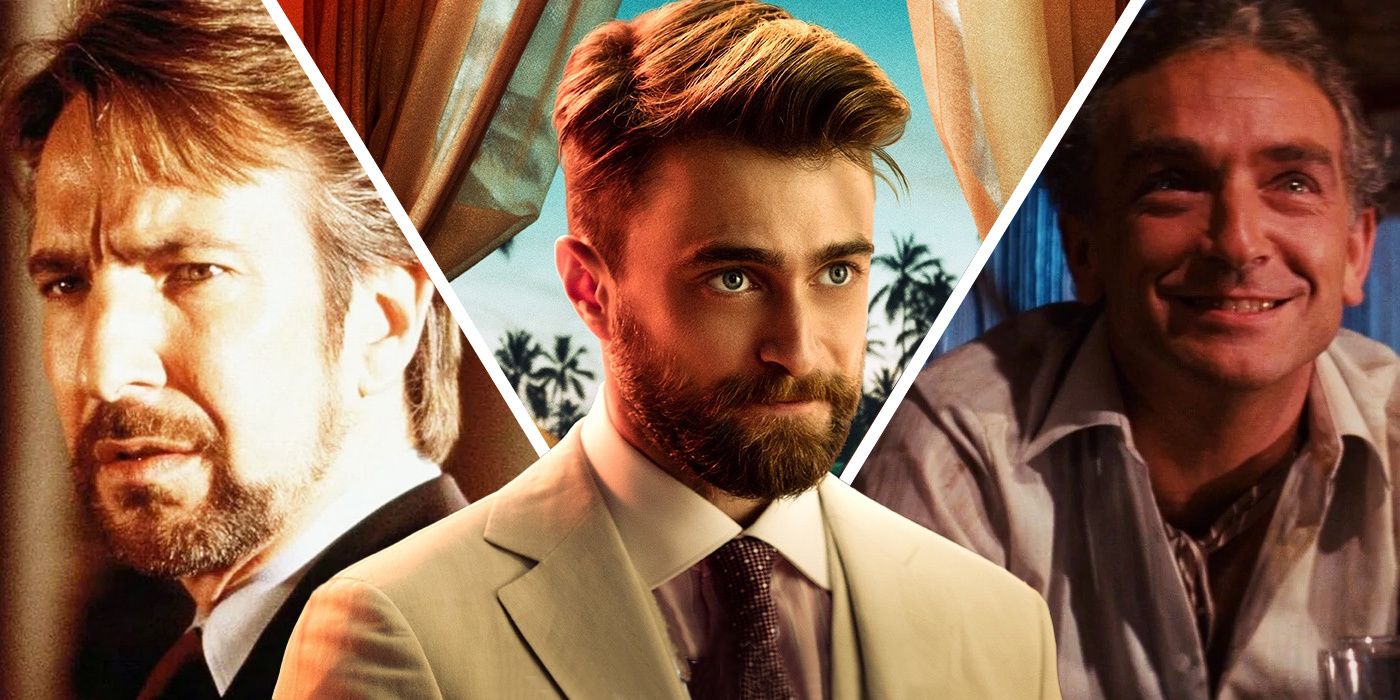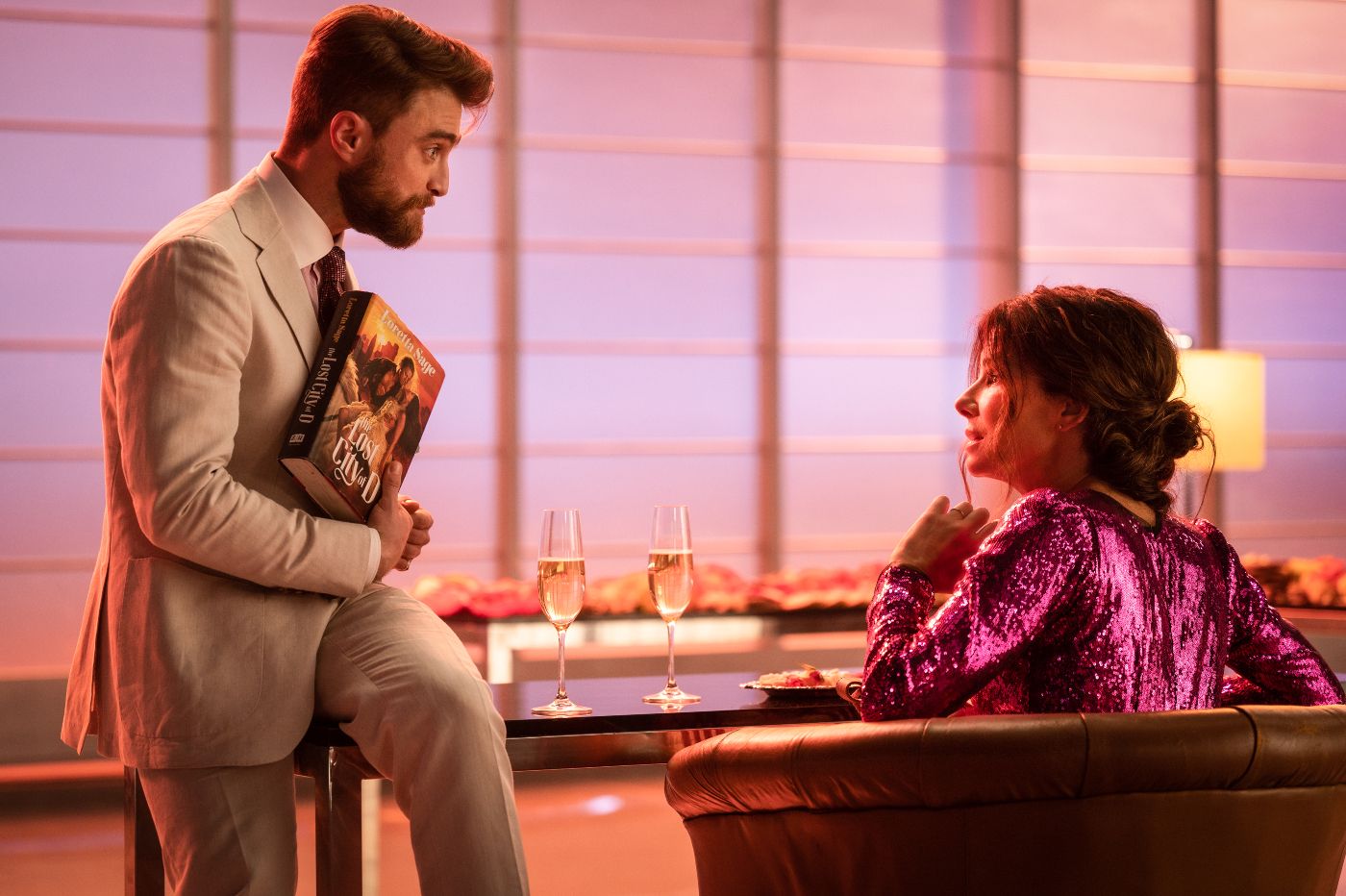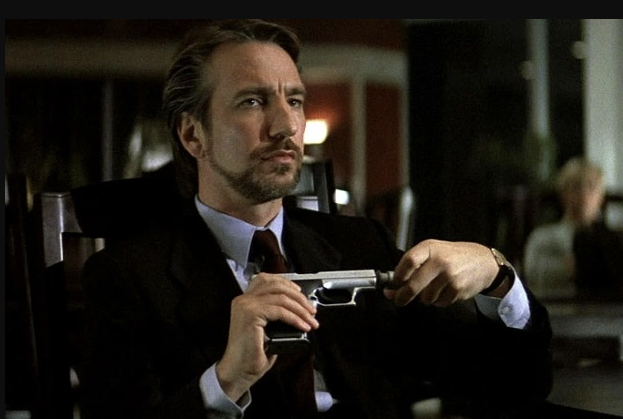Movie villains come in all shapes and sizes. Some are mustache-twirling sleazeballs. Some like to ramble on about their grand plans and show off how smart they are. Some seem crazy from moment one and just want to watch the world burn. And, hey, those types of villains are all fine. But there's another type of movie villain that is underused and underappreciated, a villain who is also delightful when deployed properly. I'm talking about the "Nice-Guy Villain" -- those antagonists who, yes, are usually up to a bunch of no-good, but go about their business so politely that you can't help but to sort of like them.
In The Lost City, Channing Tatum takes on the role of Alan, a bumbling romance-novel cover model who heads into the jungle to rescue a kidnapped author played by Sandra Bullock. The movie plays to its stars' strengths, and they're both cute as a button. But the real story here is Daniel Radcliffe's Abigail Fairfax, the British billionaire who kidnaps novelist Loretta Sage (Bullock) and forces her to help him find the Crown of Fire, a legendary treasure that is hidden deep in the jungle within a lost city. Fairfax is a fantastically good Nice-Guy Villain." He's polite. He's cheerful. He doesn't even really want to hurt anyone unless he really, really has to. And though you're unlikely to be actively rooting for him during the film, Radcliffe also sure makes it hard to hate the guy.
For starters, the film's script does a good job giving Fairfax a simple but effective motivation: He's a rich, spoiled British guy who was expecting to inherit his father's media empire but got passed over in favor of his younger brother. Sure, that would suck for anyone. But rather than sitting around bitching about it, Fairfax decides to carve out his own personal niche by discovering some ancient, exotic treasure. His only problem is that Loretta—whose recently deceased husband was an archeologist and who wrote nonfiction history books nobody bought before turning to bodice-rippers—is the only person alive with the know-how to solve the riddles that lead to the treasure. A more classically realized villain might go straight to kidnapping, and it's true that Fairfax first gets Loretta's attention by having some henchmen forcefully bring her to him. But, once they're face to face, he leads with a simple offer: "Just help me find this treasure. You'll be paid handsomely. It'll be fun. I'll show up my stupid brother. And, hey, here's a shit ton of cheese, which I know is your favorite food, just to show you how cool of a dude I am." (Yes, this is all extremely paraphrased, but I swear this is exactly how the scene plays out.)
Loretta turns him down (for nebulous reasons that seem tied to her wobbly state-of-mind), and then, okay, sure, Fairfax has to resort to some light kidnapping. There's chloroform involved, which Fairfax giddily insists is "a classic for a reason!" But even once he whisks Loretta way to a foreign jungle and starts leaning on her a little harder, he's not still overly threatening—despite the fact that she's tied up with armed guards patrolling outside. It's more like friendly coercion. Eventually, Brad Pitt shows up in a long cameo to take down a bunch of Fairfax's goons and Alan and Abigail escape into the wilderness before ultimately deciding to go after the Crown themselves. At that point, Fairfax finally does stop with the niceties and goes full maniac. But, by that point, bolstered by a smart and funny performance by Radcliffe where he often seems more giddy than menacing, Fairfax has already demonstrated he's a great candidate for the Nice-Guy Villain Hall of Fame.
And, oh, what a hallowed hall it is, with two distinct tracks for gaining admittance. You can be a compelling villain who's really not that bad of a guy. Or you can be a real scumbag who just goes about your villainy so politely and professionally that the audience almost wants to root for you anyway. Top dog in that latter camp is unquestionably Die Hard's Hans Gruber, so delectably played by the late Alan Rickman. Gruber certainly isn't a "nice guy" in the traditional sense of the word. After all, he was going to kill a party full of hostages to cover up his escape from Nakatomi Tower with $600 million in negotiable bearer bonds. But Gruber is so civil and refined that it's easy to forget about his more nefarious plans. While his team scurries around the building trying to kill John McClane, Gruber is thoughtful enough to authorize bathroom breaks for the hostages and order up a sofa for the lady who's pregnant and uncomfortable. Nothing but class that guy! Heck, if you get rid of McClane and remove a couple of Gruber's more violent machinations, Die Hard is practically a heist film featuring a gentleman thief who we love.
Just as polite and a little less gung-ho about mass casualties is Raiders of the Lost Ark's René Belloq (Paul Freeman). Belloq may hang around with the Nazis, but he's not one of them. He's mostly in the treasure-hunting game for the money and maybe the occasional opportunity to talk to god. Throughout Raiders, he's presented more as Indy's courteous but slightly darker rival than a true villain. (Toht and Dietrich are presented as more classical villains. Those dudes are not nice at all). But Belloq would just as well buy you a drink at the local bar than kill you. He's got a little crush on Marion, as he's repeatedly trying to save her from the Nazis, and mostly just wants the hero of the film to stay the hell out of his way. Some other classic Nice-Guy Villains include Inglourious Basterd's Hans Landa (Christoph Waltz), who unlike Belloq actually is a Nazi, but I'll be damned if he isn't the most congenial one around. On the opposite end of the spectrum is The Rock's Brigadier General Francis Hummel (Ed Harris), a noble warrior trying to blackmail the government in order to pay the uncompensated families of soldiers who died under his watch. Again, it's not that all of these guys are the same. In many regards, they're vastly different. But, one way or another, they all exhibit a level-headed normality that allows them to stand out amongst your standard psychotic heavies.
Marvel also occasionally offers up a villain who at least comes close to reaching nice-guy status. In Spider-Man: Homecoming, Michael Keaton's Vulture is a committed family man trying to provide for his wife and daughter in a tough world. (The first time he kills someone is a complete accident). Hannah John-Kamen's Ghost from Ant-Man and the Wasp is a sweet girl trying to cure the quantum displacement that threatens to kill her, which just happens to put her opposite the film's heroes. X-Men arch-enemy Magneto (Ian McKellen and Michael Fassbender) is happy to debate human/mutant relations over a friendly game of chess. And the whole world just watched a Spider-Man movie where three different Peter Parkers worked to turn their villains back into pleasant, upstanding human beings. You might be itching to suggest Jake Gyllenhaal's Mysterio here, but let's not forget that was all an act. Merely pretending to be nice doesn't make you a Nice-Guy Villain. (And there is also such a thing as being so overly, disturbingly nice that it quickly crosses back into terrifying. See: Misery's Annie Wilkes before she starts shattering legs.)
Radcliffe's Fairfax is such a strong candidate for the Nice-Guy Villain Hall of Fame because he could qualify on either track. He's not off-his-rocker evil, but rather an entitled rich guy with big dreams who is used to getting what he wants. Sure, he may eventually leave you to your death by sealing you inside an ancient tomb, but he's absolutely going to try to win you over with cheese and an enthusiastic argument first. Loretta maybe could have saved everyone a lot of trouble by just accepting that cheese.



